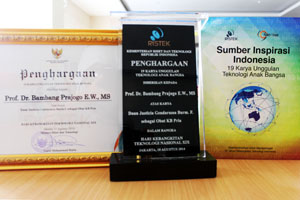
Contraception pills are usually consumed by women during their fertile period with the intention to maintain birth spacing. Now it turns out that men can also do the same thing with contraception pills. It is Prof. Dr. Bambang Prajogo E.W., MS from the Faculty of Pharmacy Universitas Airlangga who invented a contraception pill for men.
Prof. Bambang told that the invention of this contraception pill was inspired by his encounter with the late Prof. Muso from Gadjah Mada University in a scientific forum in 1985. “There is a certain plant that grows in Papua with the name of Justicia gendarussa Burm.f that is effective to lower the fertility of men. In the traditions of native Papuans, when marrying spouses are unable to pay dowry, the couple is allowed to marry but they cannot have children,” he explained.
For such couples, the male should drink gendarussa plant broth and it actually results in the couple being able to delay having children. From that indigenous knowledge, Prof. Bambang was intrigued to perform research of the gendarussa plant. “I have conducted research on gendarussa since 1987 from simple studies through clinical testing applied research with the support of S1, S2, and S3 students,” added the Vice-Dean III of the Faculty of Pharmacy.
Research have been performed on the aspects of pharmacognosy, phytopharmacy, pharmacology, to toxicity that are related to male contraception to 2008. In the beginning, there was no data that could be used as reference since the area of research was completely new. Moreover, this research uses empirical data to support scientific evidence, so that the results could be utilized by the global public. “Gendarussa is thought to be effective for making male contraception pills due to its flavonoid glycoside substance, along with several other compounds that have hyaluronidase activities after pure isolation,” he explained.
The way gendarussa works is through the inhibition of hyaluronidase activities in spermatozoa by gendarussin compounds causing the inability to pierce through the ovum and is non-hormonal (enzymatic). Prof. Bambang has just recently conducted a preclinical study on experimental animals after all effects for gendarussa had been discovered. He then performed a first phase of clinical study that has been performed in 2009 involving 36 healthy and fertile subjects. Afterwards, the second stage of clinical study was conducted in 2010 involving 120 fertile couples of fertile ages. From that study, no pregnancy was detected in any of the subjects. The clinical study was performed through cooperation with National Board of Demographics and Family Planning (BKKBN) East Java.
“Until present, studies are still being conducted to obtained the ideal product that is secure, cheap, effective, has no side effects, and acceptable to all segments,” the lecturer of the Department of Pharmacognosy and Phytochemistry added.








